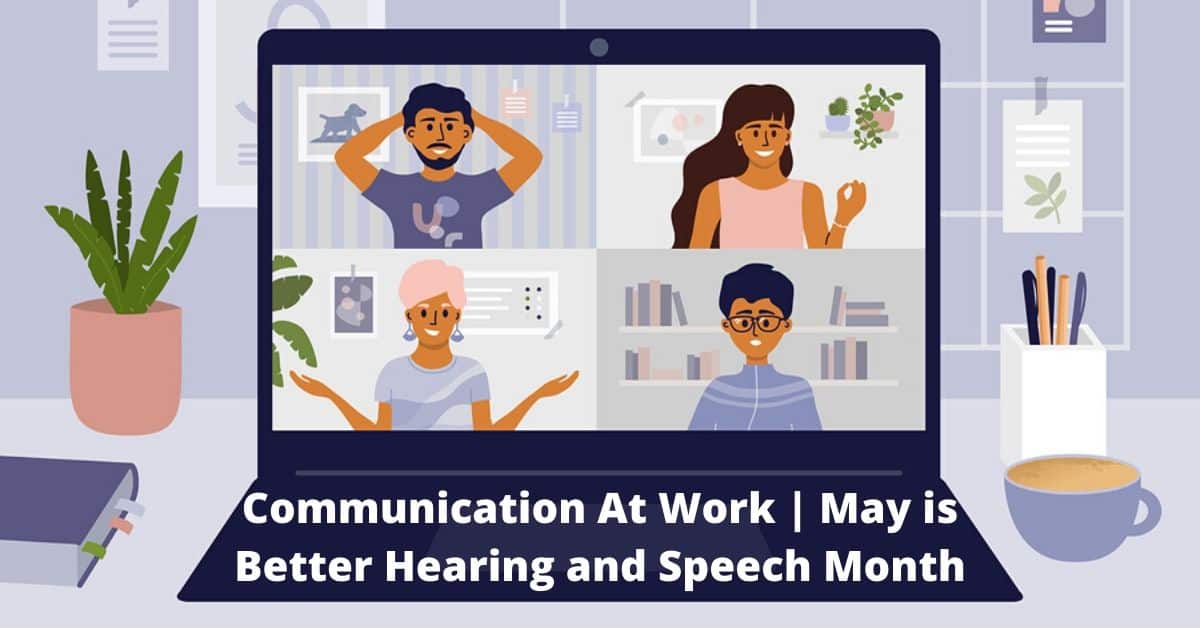- Understanding the Connection Between Tinnitus and Weather - May 17, 2025
- The Most Unexpected Reasons Hearing Aids Can Malfunction - May 9, 2025
- How OAE Testing Unveils Hidden Hearing Loss - April 15, 2025
Navigating your workplace with hearing loss can be difficult. No matter what type of job and work environment you are in, hearing loss presents challenges that can be stressful if not addressed with intention and care. You may feel anxious about acclimating to your workplace with hearing loss which is normal! Impaired hearing reduces one’s ability to hear and can strain communication, impacting one’s daily life. Having conversations with coworkers, participating in meetings, and interacting with others can become tough. There are effective communication strategies and useful tips you can practice to help you best succeed in your workplace!
Disclosing Hearing Loss
One of the first questions people typically have is if they should notify their employer of their hearing loss. This can cause fear, anxiety, and stress because you may not be entirely comfortable sharing this information, not realize the significant impact it can have on your job performance, may not want your supervisor to think you cannot manage your responsibilities etc. However, you should absolutely disclose your hearing loss to your coworkers and supervisor for several reasons including:
- Let’s the people you work with know why you may need to approach things differently or why it may take you more time to process instructions/information.
- Opens the conversation about your hearing needs and allows others to support you and share the responsibility of engaging in effective conversations.
- Disclosing your hearing loss ensures that you are protected under the Americans with Disabilities Act (ADA) which is law that prohibits discrimination based on disability and ensures accommodations.
Disclosing your hearing loss allows you to share and advocate for your hearing needs. It also creates a greater support system in the workplace that alleviates the burden or pressure of communication you may feel. Ensuring your success in the workplace is a shared responsibility and notifying your employer allows them to also participate!
Tips
In addition to disclosing your hearing loss, there are numerous useful tips you can practice to help enhance communication in the workplace. This includes the following:
-
Treat Hearing Loss
Addressing and treating your hearing loss is critical! This is the most important step of strengthening your communication. Treating your hearing loss begins by having your hearing assessed. Hearing exams involve a relatively quick, non-invasive, and painless process that determines the degree and type of hearing impairment you are experiencing. The most common treatment for hearing loss is hearing aids which are small electronic devices that are designed to absorb, amplify, and process sound. Increasing one’s ability to hear, hearing aids can be customized to your needs and lifestyle to ensure a seamless transition to wearing them daily.
This process of treating your hearing loss and working with hearing healthcare professionals also allows you to learn about your hearing: what sounds are more difficult for you to hear, what type of environments strain your hearing, what helps you hear etc. This information is really valuable because it deepens your understanding of what your hearing needs are and how others can best accommodate.
-
Share Communication Strategies
Learning about your hearing needs allows you to figure out what helps you hear. There are various communication strategies you can share with others that support having effective conversations including: making eye contact, directly facing you, grabbing your attention before beginning a conversation, rephrasing rather than restating when you have a hard time hearing specific words etc.
-
Learn About Workplace Accommodations
Disclosing your hearing loss also starts a conversation about the workplace accommodations that are available to you (and mandated by the ADA). It is important to do some research beforehand so you are aware of your options and can advocate for them. There are various types of workplace accommodations that an employer can provide, a few include:
-
- Adjustments to work area: you can request to move to a quieter work area, or have a physical barrier placed between you and any sources of loud noise.
- Hearing Aid Compatibility: if you work with electronic devices (phones, laptops etc.), you can have them connected directly to your hearing aids.
- Anticipate and Plan for Hearing Needs
To protect your hearing health, it is important to anticipate and plan for your hearing needs in the various contexts you may find yourself in at work. This could mean asking for the agenda prior to meetings, summarizing and sending email confirmations, keeping extra batteries for hearing aids at work etc.
By sharing your hearing loss and practicing a few helpful tips, you can navigate your workplace with greater ease!

